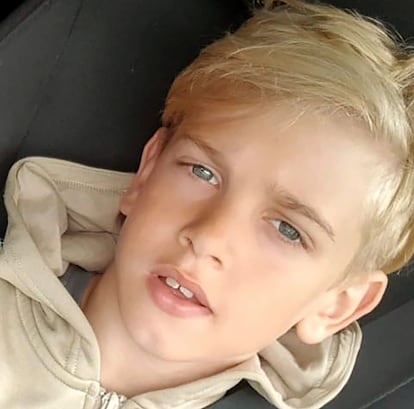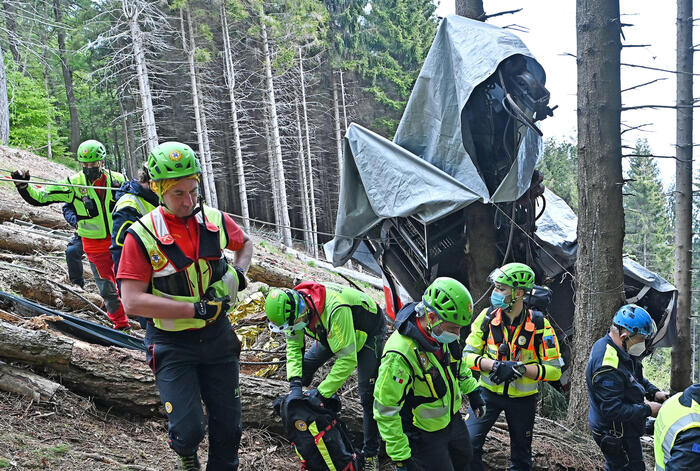The legal battle that the family of the British boy Archie Battersbee, 12, in a coma since his alleged participation in a viral challenge, maintains with the London hospital where he is admitted has taken a turn, just when he was closest to reaching its end.
After a frenetic legal day, in which the Superior Court denied the transfer of the minor to a palliative care center and the Court of Appeals refused to authorize the parents to appeal against the decision, the parents launched the last resort of appealing before the European Court of Human Rights.
His appeal to the court of Strasbourg (France) aspires to obtain the permission that all British judicial instances have denied them in their desire to take the child to a hospital for the terminally ill,
Once the parents have exhausted all avenues to avoid the withdrawal of life support, the fight between the family and the doctors, who had already obtained judicial authorization last June to disconnect the child, now focuses on where the child will spend his last hours of life.
The family, dissatisfied with the "circumstances" of the center where he is admitted and given the lack of "trust" they say they feel towards his staff, wants to take him to a hospice.
The judge of the Superior Court, however, protected this Friday the position of the health authorities, who opposed it, citing the risk that a transfer, even a short one, would entail for the already critical state of the child, whose brain stem is considered clinically dead.
The magistrate has justified her decision based on "the best interests" for Archie, once the parties have been heard at the hearing held this Thursday.
The hearing lasted for hours, to give ample room for intervention to the legal representatives of the family, who are being advised by the Christian Legal Center (a legal organization with a marked Christian influence), and the Barts NHS Trust, the entity that manages the Royal London Hospital, the center where Archie has been admitted since April 8, a day after being found unconscious by his mother.
The parents believe that the child was the victim of the so-called TikTok fainting challenge, an extremely dangerous initiative that circulates on the video social network.
In this case, he involves suffocating until he loses consciousness and has already caused the death of two girls in the United States, whose parents have denounced the platform.
According to their families, the algorithm used by the social network offers content that is lethal to minors, but TikTok alleges that many of these viral challenges already existed and defends itself by ensuring that it removes any content that encourages harmful behavior.
Archie Battersbee, in a file photo.
Hollie Dance (AP)
What had started as a tragedy for Archie's family, with ramifications on the responsibility of social networks in protecting the most vulnerable, especially children, has led to an unfortunate confrontation in which parents have ended up perceiving as the enemy to health personnel, to the hospital where his son is and to British justice itself.
The mother, Hollie Dance, has repeatedly expressed her condemnation of a legal and ethical framework that, in her opinion, has failed the 12-year-old boy by not giving him the opportunity to live, and has demanded a comprehensive reform of the legislation that expands the room for maneuver of families.
It has been of no use that successive judicial instances, without exception, have supported the vision of the doctors, who maintain that, given the "highly probable"
death of the brainstem, "the best interests" of the little one is to withdraw the protocol that keeps him alive artificially, including a ventilator to breathe and a combination of drugs.
The first intervention of the courts took place only 19 days after the incident, when the manager of the hospital began proceedings before the High Court to do tests on the brain stem.
A judge gave his authorization, but when the specialists tried to carry out the tests, on May 16, they could not perform them on the brainstem itself because when they began to work they encountered a lack of response from the so-called peripheral nerve.
This is a very bad sign, when it occurs it prevents the brainstem from being tested.
The only alternative left to them then was an MRI scanner, something that the hospital considered necessary and for which they also requested judicial approval, since the parents refused, alleging that moving Archie could harm him.
On May 31, the worst fears were confirmed: there was no activity in the brainstem, which, according to doctors, indicates that it is "highly probable" that the stem is dead.
That day is considered, in fact, the clinical death of the child.
As a consequence, and following the usual protocol, the debate centered on whether life support should continue, and on June 13, a judge ruled, based on the results of the scan, that Archie had died and, therefore, it was time to withdraw treatment.
That was also the day that everything changed for the parents, since that is where their legal battle really began.
After appealing to the Court of Appeals, they obtained a new hearing to establish the "best interests" of the child, but on July 15 another Superior Court judge determined that keeping him connected was "in vain", so the doctors had the green light to disconnect it.
Ask the UN for protection
From there, a game of judicial ping-pong began, of appeals and rebuttals, in which Justice has always agreed with the doctors.
Instances such as the Supreme Court, the highest judicial authority in the country, refused to even intervene, so, with the date and time already set for the disconnection, last Monday at two in the afternoon, and with no more doors to knock on in the United Kingdom, the family requested the protection of the UN, specifically the Commission for the Protection of the Rights of Persons with Disabilities.
The United Nations body, which is responsible for watching over the group of disabled people, wrote to the British government to ask it to delay the withdrawal of life support, with the aim of being able to study the case.
The Executive, reluctant to intervene directly, requested an urgent hearing that was, once again, unsuccessful for the family: the Court of Appeals on Monday rejected ordering a wait, concluding that neither the UN commission nor its conventions are binding in the United Kingdom, the same reason why the Supreme Court rejected the family's identical request on Tuesday.
The last cartridge left to the parents was, therefore, the European Court of Human Rights, which on Wednesday was reluctant to "intervene" in domestic judicial decisions.
On the threshold of the hospital where she has spent practically every day of the last four months, the mother publicly directed the most serious recrimination up to that point towards the managers of the center, the health system and the judicial system, the result of the desperation of a legal impasse, which meant that the moment they had managed to delay every day of this week was now imminent.
Parents have always defended that, if they maintain medical support for the child, he could continue to live.
Experts in Ethics of Law point out that it is precisely the formula questioned by Archie's environment that is the safeguard that in the United Kingdom guarantees the inviolable protection of the patient and the priority of their rights, above all else, including the interests and wishes of the families.
But together with the delicate transfer to a hospice, something that, according to the Barts NHS Trust, “will probably accelerate the premature deterioration that the family wants to avoid”,
the parents have also requested palliative oxygen for the child, once life support has been withdrawn.
The judge has considered this Friday that this decision is the responsibility of the medical team, so what happens depends on them.
If not obtained, the mother has advanced that she will resort to mouth-to-mouth resuscitation, to, according to her, allow her son to die "with dignity."
Something reminiscent of the case of Alfie Evans, a two-year-old boy with a neurodegenerative disease, whose body reacted with desperate attempts to breathe when, in 2018, he was disconnected from the machines that kept him artificially alive.
50% off
Subscribe to continue reading
read without limits
Keep reading
I'm already a subscriber








